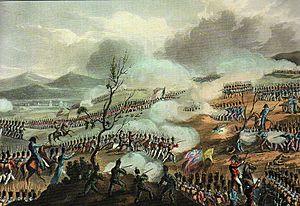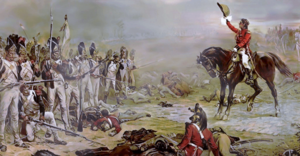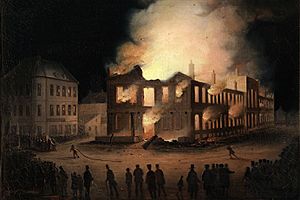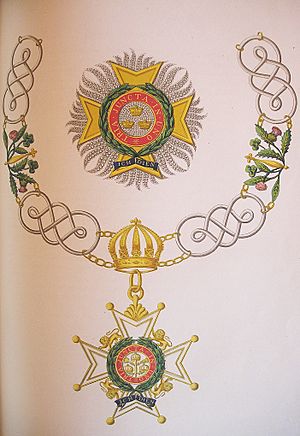William Rowan facts for kids
Quick facts for kids
Sir William Rowan
|
|
|---|---|
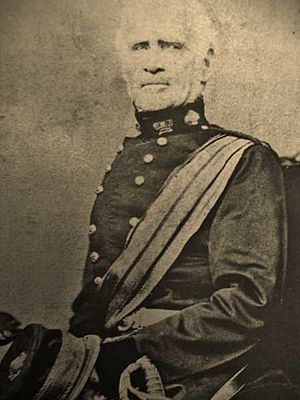
Sir William Rowan
|
|
| Born | 18 June 1789 Isle of Man |
| Died | 26 September 1879 (aged 90) Bath, Somerset |
| Allegiance | |
| Service/ |
|
| Rank | Field Marshal |
| Commands held | British troops in Canada |
| Battles/wars | Napoleonic Wars |
| Awards | Knight Grand Cross of the Order of the Bath |
Sir William Shearman Rowan (born June 18, 1789 – died September 26, 1879) was a very important officer in the British Army. He became a Field Marshal, which is the highest rank in the army.
Sir William fought in many big wars, including the Peninsular War and the Hundred Days. He was even at the famous Battle of Waterloo. There, he was part of a brave charge against the Imperial Guard and was hurt. Later, he helped Sir John Colborne in Canada during some difficult times. He even became the main commander of British troops in North America. In 1849, he gave an important speech after a mob burned the Parliament Buildings in Montreal, helping to calm things down.
Contents
Sir William Rowan's Life
Growing Up
William Rowan was born on June 18, 1789. His father was Robert Rowan, and his mother was Elizabeth Rowan. He had an older brother, Sir Charles Rowan. Charles later became a police chief in London. Many men in their family, including William's uncle and other brother, were also army officers.
Starting His Army Career
William joined the army when he was just 14 years old. On November 4, 1803, he became an ensign in the 52nd Light Infantry. This was a famous regiment. He quickly moved up in rank, becoming a lieutenant in 1804 and a captain in 1808.
He traveled to different places with the army. In 1806, he went to Sicily, and in 1808, he was in Sweden.
Fighting in the Peninsular War
William Rowan fought in the Peninsular War in Spain. He was under the command of General Robert Craufurd. He helped cover the retreat of Sir John Moore's army.
He was also part of the attack on Flushing in 1809. After that, he returned to Spain and fought in many important battles:
- Battle of Sabugal in 1811
- Battle of Vitoria in 1813
- Battle of the Pyrenees in 1813
- Battle of the Bidassoa in 1813
- Battle of Nivelle in 1813
- Battle of the Nive in 1813
- Battle of Orthez in 1814
- Battle of Toulouse in 1814
He was promoted to major in 1814 because of his bravery at the Battle of Orthez. His actions there helped Wellington's army win the battle.
The Battle of Waterloo
In June 1815, William Rowan fought in the famous Battle of Waterloo. This was a huge battle that ended the Napoleonic Wars. He was part of a very important charge led by Sir John Colborne against Napoleon's Imperial Guard. During this charge, Rowan was wounded, and many of his soldiers were hurt or killed.
After the war, he stayed in France as part of the army that kept the peace. He was put in charge of a part of Paris.
Service in Canada
William Rowan was promoted to lieutenant colonel in 1819. In 1823, his regiment was sent to New Brunswick, Canada. He became a full major in 1826 and a lieutenant colonel in 1830.
In 1832, he became a secretary to Sir John Colborne, who was a leader in Upper Canada. William Rowan was promoted to colonel in 1837. He helped Colborne when he became the acting Governor General of British North America. This was during the rebellions by the Patriote movement in 1837, a time of unrest.
William Rowan was given an award, the Companion of the Order of the Bath, in 1838. He then returned to England in 1839.
In 1849, Rowan came back to Canada as the Commander-in-Chief, North America. This meant he was in charge of all British troops there. In April 1849, an angry crowd burned the Parliament Buildings in Montreal. Rowan gave an important speech that helped calm the situation. He was promoted to lieutenant general that same year.
Later Life and Retirement
In 1855, William Rowan returned to England and retired in Bath. He continued to receive honors for his service. He became a Knight Commander of the Order of the Bath in 1856.
He was also the colonel of two different regiments: the 19th Regiment of Foot and later the 52nd Light Infantry. He was promoted to full general in 1862. In 1865, he received an even higher honor, becoming a Knight Grand Cross of the Order of the Bath.
Finally, on June 2, 1877, he reached the highest rank possible: field marshal. Sir William Rowan passed away on September 26, 1879, at the age of 90. He was buried in Bath.
Family Life
William Rowan married Martha Spong in 1811. They did not have any children. They lived together in Bath for many years.
Awards and Honors
Sir William Rowan received several important awards for his bravery and service:
- Knight Grand Cross of the Order of the Bath (1838, later upgraded)
- Waterloo Medal (1815)
- Military General Service Medal (1848) with special clasps for battles like Vittoria, Pyrenees, Nivelle, Nive, Orthes, and Toulouse.
 | Shirley Ann Jackson |
 | Garett Morgan |
 | J. Ernest Wilkins Jr. |
 | Elijah McCoy |


